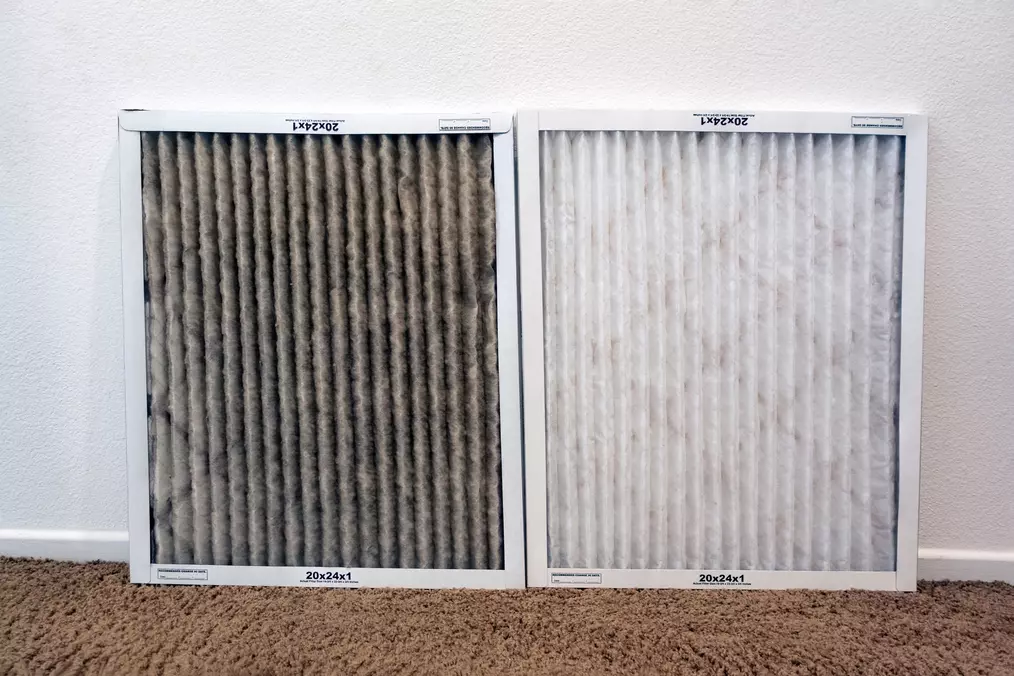Investing in a quality air conditioner filter replacement is the simplest and most effective way to achieve indoor air quality in your home. They are in your HVAC, vehicles, air purifiers, and more. An air filter’s job is simple: trap harmful air particles as they circulate through the house. This simple function often goes overlooked. However, you see, smell, taste, and feel the results daily. So, it’s important to insert AC filters or furnace filters that do an exceptional job of removing particles from the air. The same goes for your air purifier. Even if you have the best air purifier or HVAC system, your air quality is only as good as your filter.
If you’re unsure where to find the best air filters for your home, ask an expert. Your local HVAC company is a great place to start. HVAC technicians work on all heating and cooling brands and models. They can recommend the best air purifiers, size, dimension, filtering material, construction, and type perfectly suited for your furnace or AC.
Below, we cover everything you need to know when shopping for AC filters or furnace filters. If you have additional questions, contact our filter specialists online or by phone. We’re happy to help!
What Filters Do HVAC Techs Recommend for Air Quality?
It’s a loaded question.
Since there is an assortment of AC and furnace brands and models, it’s hard for any HVAC professional to suggest one type of filter. They often consider several factors, including:
| MERV Rating | The MERV (Minimum Efficiency Reporting Value) rating measures the filter’s ability to capture particles of different sizes. Higher MERV = better filtration but could mean more airflow resistance. For instance, MERV 8 is the minimum for good residential filtration. |
| Filter Material | Different materials like pleated cotton, fiberglass, or polyester affect filtration and airflow. Pleated filters provide higher MERV ratings but could restrict airflow more than basic fiberglass. |
| Proper Sizing | Filters must be sized correctly to fit the filter slot and allow proper airflow without gaps. A 20x25x1-inch pleated filter may be ideal for a typical furnace. |
| Airflow Resistance | Higher MERV filters can create more static pressure/airflow resistance, which the system must overcome. A high MERV 13 filter may restrict airflow on an older system. |
| Application | The filter type depends on the specific needs – residential, commercial, allergies, odor removal, etc. A home with pets may need a MERV 11 filter. |
| Longevity | Some filters last longer than others. A pleated filter can last 60 to 90 days. By contrast, a standard fiberglass filter may last only 30 days. |
Remember, an HVAC technician cannot blindly recommend a filter for your home. In most cases, they’ll need to assess your home with a air quality sensor to determine the best indoor air quality solution. Their reputation as professionals is always on the line. So, they make professional recommendations based on an actual assessment to deliver exceptional, long-term results you’ll be satisfied with.
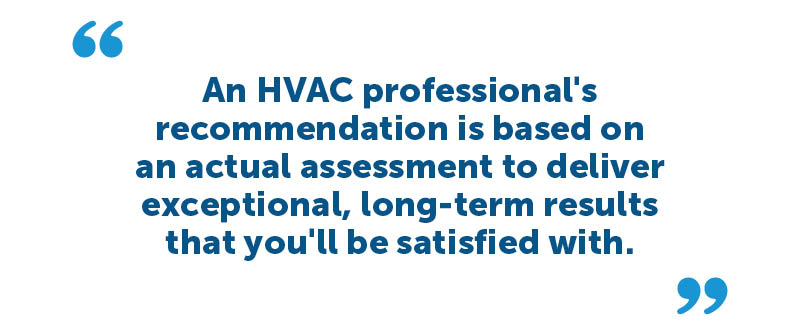
Brand and Model Suggestions
Something else that influences HVAC tech recommendations is brand and product reputation. After installing, cleaning, and replacing countless filters, experts know which brands they can trust. We carry the best air filters installed by HVAC professionals every day.
Some of our most popular filter brands and models include:
| Filtrete | Filtrete is a 3M brand known for its electrostatically charged synthetic filters that attract and capture small particles effectively. Filtrete Smart filters can last up to 9 months and are designed to optimize airflow for HVAC efficiency. |
| Carrier | Carrier’s air filters utilize a proprietary Hydro-Flo technology that uses moisture to enhance particle capture. Their Infinity filters with Capture & Calming technology help reduce airborne viruses and odors. |
| Honeywell | Honeywell’s filters feature a unique Alternating Rigid Electrostatically Charged (ARErm) media that combines electrostatic properties with a rigid design to improve dust-holding capacity while minimizing airflow resistance. |
| Trane | Trane’s CleanEffects filters use an exclusive “air cleaning system” that is designed to remove up to 99.98% of particles as small as 0.1 microns, including bacteria, viruses, mold spores, and smoke. |
| Lennox | Lennox PureAir and Healthy Climate filters incorporate germ-fighting ingredients like antimicrobial treatment to inhibit mold and bacteria growth on the filter surface itself. |
Choosing the right filter brand is not the same as choosing the right type. So, you’ll need to establish different criteria to land a brand that is right for you. As you can see above, each brand has a distinctive line of filters with unique technology and features for removing the particles from the air.
Here are some things to consider when comparing brands:
- Filter construction and features
- Customer ratings and reviews
- Dust holding capacity and filter lifespan
- Available in different sizes and configurations
- Brand reputation and customer reviews/feedback
- Warranty coverage and customer service
When comparing brands you can read customer reviews and get advice from experts. However, you may have to do a trial-and-error approach until you find the right filter.
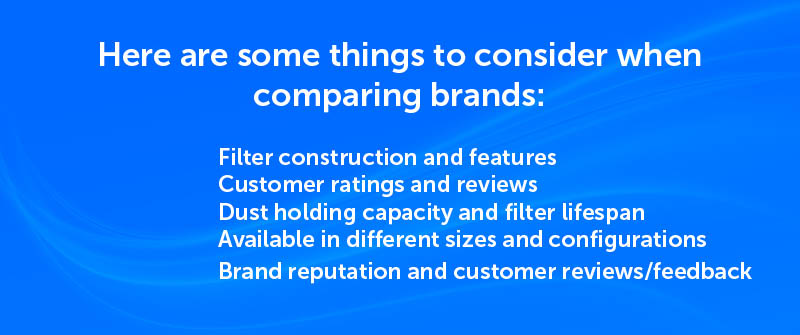
Which Filter Is Better: HEPA or MERV?
When we talk about HEPA and MERV filters, we’re really referring to two different classes of air filtration. To understand it, we need to provide a little bit of an explanation of each type of filter.
What Is a Standard MERV Filter?
MERV stands for Minimum Efficiency Reporting Value. It’s a rating system that shows how effective an air filter is at capturing different sizes of airborne particles. The higher the MERV rating, the better the filter is at removing tiny particles like smoke, bacteria, and allergens from the air.
MERV ratings range from 1 to 16 for residential filters and even up to 20 for hospital-grade filters. For example, a MERV 8 filter captures particles down to 3 microns in size, while a MERV 13 filter can remove particles as small as 0.3 microns. Choosing the right MERV rating depends on your home’s needs and your HVAC system’s capabilities.
What Is a HEPA Filter?
A HEPA filter is a type of air filter that meets strict standards for particle removal efficiency. HEPA stands for High Efficiency Particulate Air. These filters can capture at least 99.97% of particles as small as 0.3 microns in size.
HEPA filters have MERV ratings of 17 to 20, which is the highest rating for air filters. Their dense filter material allows them to trap microscopic pollutants like bacteria, viruses, mold spores, and smoke particles.
HEPA filters are commonly used in hospitals, cleanrooms, and industrial settings. It possible realize HEPA-like efficiency with a portable room air cleaner, but HEPA filters do not have a place for whole-house residential applications.
Remember: If you’re doing a comparison of HEPA and MERV filters, what you’re really comparing is MERV ratings. Learn more about what MERV rating is best for furnace filters?
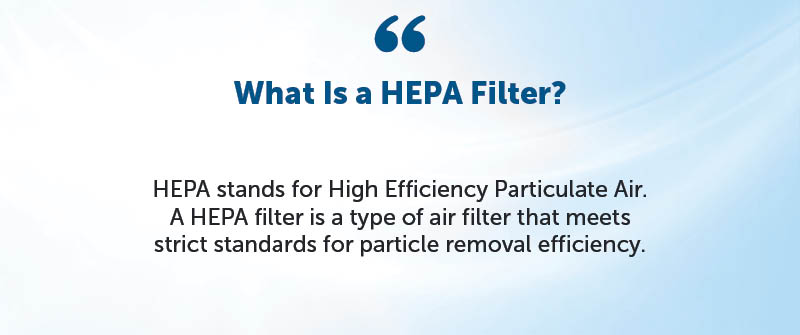
When You Need a Standard MERV Filter
In most cases, you only need a filter with a MERV rating of one to 16. Anything above that may provide exceptional filtration but restrict airflow and put too much strain on your furnace or AC. Try to stay within the five to 13 MERV range.
When You Need a HEPA Filter
If you require HEPA filtration for severe allergies or respiratory challenges, it’s best to look at a portable air cleaner to purify the air in a specific room, like a bedroom or living room.
What MERV Rating Is Best for Home Use?
There’s no straightforward answer here. As we’ve covered above, there are several factors that determine the best MERV rating for your home.
Recommended MERV ratings for residentials settings are typically five to 13. Anything higher than that can restrict airflow and put a strain on your heating and cooling system. So, you’ll need to balance efficiency, cost, and HVAC system compatibility.
Here’s a quick comparison of different MERV ratings and their ideal applications:
| MERV Rating | Particle Size Captured | Best Application |
| 1-4 | 3.0 – 10.0 microns (<20% efficiency) | Window AC units, residential |
| 5-8 | 3.0 – 10.0 microns (20-85% efficiency) | Better residential, light commercial |
| 9-12 | 1.0 – 3.0 microns (50-85% efficiency), 3.0 – 10.0 microns (>85% efficiency) | Commercial buildings, superior residential |
| 13-16 | 0.3 – 1.0 microns (50-95% efficiency), 1.0 – 3.0 microns (>85% efficiency), 3.0 – 10.0 microns (>90% efficiency) | Hospitals, general surgery, better commercial buildings |
| 17-20 | 0.3 – 1.0 microns (>99.9% efficiency) | Cleanrooms, nuclear facilities, COVID isolation rooms |
Remember: The higher the MERV rating, the smaller the particle size that can be filtered from the air. However, higher ratings also create more airflow resistance, so the proper MERV must be selected based on the HVAC system’s capabilities.
Which Type of Air Filter Is Best?
Of all the filter types out there, one is an ideal match for your heating and cooling system. Below, we look at the benefits and features of four popular air filters to determine the best air filter types for you.
HEPA Air Filters
HEPA filters remove at least 99.97% of airborne particles as small as 0.3 microns, including bacteria and viruses. They are commonly used in hospitals, cleanrooms, and homes of those with severe allergies or respiratory issues.
Pros:
- Extremely high filtration efficiency for tiny particles
- Captures allergens, smoke, mold spores, bacteria, viruses
- Long filter lifespan of 6-12 months
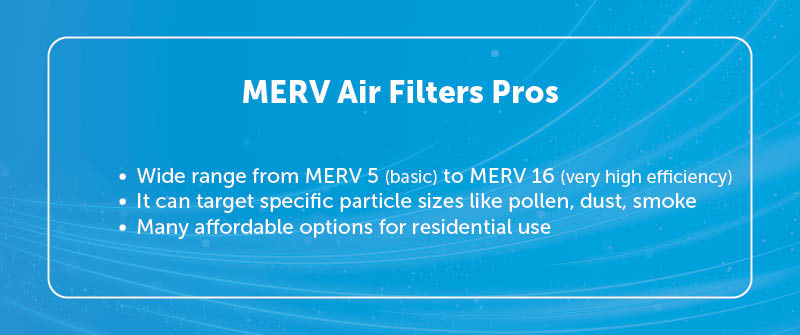
Cons:
- Expensive upfront and replacement costs
- Limited to portable air cleaners
MERV Air Filters
These are pleated filters rated on a scale of 1-16 based on their ability to capture particles of different sizes. Higher MERV = better filtration but more airflow resistance.
Pros:
- Wide range from MERV 5 (basic) to MERV 16 (very high efficiency)
- It can target specific particle sizes like pollen, dust, smoke
- Many affordable options for residential use
Cons:
- Higher MERVs (13+) can restrict airflow
- Require more frequent replacement
- Proper sizing is critical to avoid airflow issues
Charcoal Filters
These utilize activated carbon or charcoal media to absorb odors, gases, and some airborne particles through the porous surface area.
Pros:
- Effective at removing odors from pets, smoke, cooking, VOCs
- It can be combined with particle filters for added odor control
- Relatively inexpensive option
Cons:
- Limited particle filtration ability, especially for small particles
- Have a finite odor absorption capacity before replacement is needed
- It can promote microbial growth if not replaced regularly
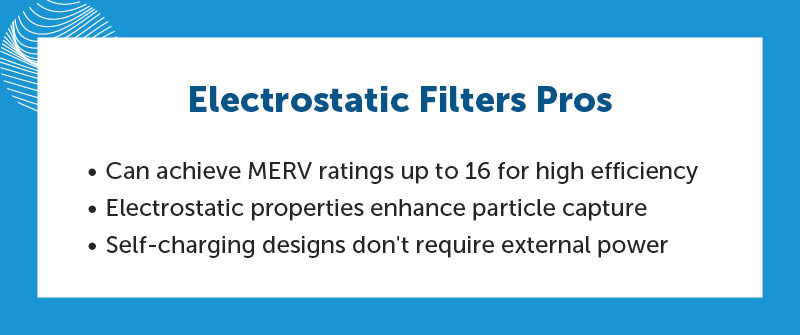
Electrostatic Filters
Electrostatic filters use an electrostatic charge to attract and capture particles as air passes through the filter media.
Pros:
- Can achieve MERV ratings up to 16 for high efficiency
- Electrostatic properties enhance particle capture
- Self-charging designs don’t require external power
Cons:
- Electrostatic charge can be temporary and degrade over time
- Require more frequent cleaning/replacement than pleated filters
- It can produce ozone as a byproduct, causing potential health concerns
Final Recommendations for Best Air Filters
As you can see, there is no one-size-fits-all solution for air filters. As a homeowner, you need to consider the type of heating and cooling equipment you have in the house and then match it with the most compatible filter. You can compare products by looking at your HVAC owner’s manual, speaking with an HVAC expert, or going online to find brand comparisons.
The main thing to keep in mind is balancing air filtration with airflow. You want a filter that removes harmful particles from the air without putting a strain on the system. Once you establish this criteria, you can look at other factors such as efficiency, lifespan, features, and your home environment.
Order the Best High-Quality Replacement Filters From Discount Filters
At Discount Filters, we help homeowners create a cleaner, healthier home environment with quality filters from today’s top brands. Shop our online store to find the perfect filter for your home. Got questions? Contact one of our filter experts via live chat or our toll-free number!

